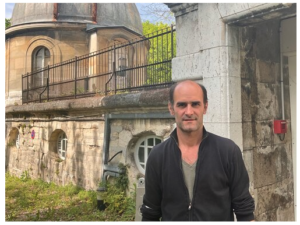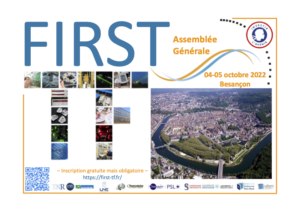Catégorie : Evènements Scientifiques
Assemblée Générale de FIRST-TF 2022 : 04 et 05 octobre 2022 – Besançon
L’Assemblée Générale de FIRST-TF aura lieu cette année les 04 et 05 octobre 2022 à Besançon sur le site de l’ENSMM.
Il s’agira d’un moment d’échange important entre les laboratoires, les industriels, les centres techniques et agences, les établissements qui contribuent à la vie du réseau FIRST-TF. Cette assemblée générale sera l’occasion de présenter les résultats des projets soutenus par FIRST-TF et de débattre sur des sujets spécifiques. A la fin de la première journée, nous nous retrouverons autour d’un dîner.
Voir ici le Programme de l’AG FIRST-TF 2022 à Besançon et informations pratiques
Soutenance de thèse de Zhibin Yao – 5 septembre 2022 à 14h00, amphi Durand (Campus Pierre et Marie Curie).
Zhibin Yao soutiendra sa thèse le 5 septembre à 14h00, sur le sujet “Interférométrie atomique avec le condensat de Bose-Einstein : vers une détermination de la constante de structure fine”, préparée à Sorbonne Université, dans le cadre de Physique en Ile de France, et sous la direction de Saïda Guellati-Khélifa au LKB. La soutenance sera en anglais et aura lieu dans l’amphi Durand (Campus Pierre et Marie Curie). Vous pourrez aussi suivre la soutenance via ce lien Zoom : Soutenance_Thèse_Zhibin Yao_“Interférométrie atomique avec le condensat de Bose-Einstein : vers une détermination de la constante de structure fine”
ACES Workshop 2022 à Paris
Le ACES Workshop 2022 aura lieu les 20-21 octobre à l’École Normale Supérieure, 29 rue d’Ulm – Paris.
Les inscriptions sont maintenant ouvertes. Nous encourageons chaleureusement tous les participants à soumettre des résumés.
Plus d’informations sur le workshop ici : https://aces2022.sciencesconf.org/ et ACES_Workshop_Announcement
Assemblée Générale FIRST-TF 2022 – Besançon : les inscriptions sont ouvertes !
L’Assemblée Générale de FIRST-TF aura lieu cette année les 04 et 05 octobre 2022 à Besançon sur le site de l’ENSMM.
Il s’agira d’un moment d’échange important entre les laboratoires, les industriels, les centres techniques et agences, les établissements qui contribuent à la vie du réseau FIRST-TF. Cette assemblée générale sera l’occasion de présenter les résultats des projets soutenus par FIRST-TF et de débattre sur des sujets spécifiques. A la fin de la première journée, nous nous retrouverons autour d’un dîner.
La participation à l’AG est gratuite mais l’inscription est obligatoire. Vous pouvez vous inscrire avant le 05 septembre 2022 : Inscription à l’AG de FIRST-TF 2022
Les informations pratiques ainsi que le programme de l’AG sont consultables ici : https://first-tf.fr/le-reseau/presentation/assemblees-generales/
International Conference sur “Quantum sensors and tests of new physics”, 5 – 7 octobre 2022 à l’Hotel Wienecke XI, Hanovre (Allemagne).
La conférence est organisée et financée par la “Collaborative Research Center DQ-mat and the Cluster of Excellence Quantum Frontiers”. La participation est gratuite. Le nombre de participants étant limité, les places disponibles seront attribuées par un comité scientifique sur la base des résumés soumis. La date limite d’inscription est fixée au 30 juin 2022.
Plus d’informations sur la page d’accueil https://www.conference-qsnp.uni-hannover.de/
AG FIRST-TF 2022 – 4 et 5 octobre 2022 à l’ENSMM (Besançon) : SAVE THE DATE !
L’Assemblée Générale de FIRST-TF aura lieu cette année les 4 et 5 octobre 2022 à Besançon sur le site l’ENSMM (École Nationale Supérieure de Mécanique et des Microtechniques).
Le programme ainsi que les détails de cette AG vous seront communiqués très prochainement.
Sylvain Ballandras lauréat du Cady Award 2022
 Le Cady Award 2022 est décerné à Sylvain Ballandras en récompense ”Pour ses contributions exceptionnelles à la modélisation et au développement de résonateurs et de capteurs à cristaux.”
Le Cady Award 2022 est décerné à Sylvain Ballandras en récompense ”Pour ses contributions exceptionnelles à la modélisation et au développement de résonateurs et de capteurs à cristaux.”
The Cady Award is to recognize outstanding contributions related to the fields of piezoelectric or other classical frequency control, selection and measurement; and resonant sensor devices.
Sébastien Bize lauréat du European Frequency and Time Award 2022 de l’European Frequency and Time Forum

Sébastien Bize a reçu le prix EFTF 2022 Award « Pour ses contributions exceptionnelles au développement d’étalons de fréquence micro-ondes et optiques pour les tests de physique fondamentale et la réalisation de la seconde SI. »
Le prix European Frequency and Time Award récompense les contributions exceptionnelles dans tous les domaines couverts par l’EFTF.
Soutenance de thèse de Shuo Zhang – 13 avril 2022 à 9h30
Shuo Zhang soutiendra sa thèse le 13 avril à 9h30, sur le sujet ”Spectral Hole Burning for Ultra-stable Lasers”, préparée à l’Université Université Paris sciences et lettres dans le cadre de Physique en Ile de France, en partenariat avec le SYRTE à l’Observatoire de Paris et sous la direction de Yann Le Coq, Bess Fang-Sortais et de Signe Seidelin. La soutenance aura lieu devant le jury seul dans la Salle du Conseil de l’Observatoire de Paris (77 avenue Denfert Rochereau, Paris 75014). Vous pourrez suivre la soutenance via ce lien Zoom : Soutenance _Thèse_Shuo Zhang_Spectral Hole Burning for Ultra-stable Lasers
OPTIQUE Nice 2022 – Appel à contribution
Du lundi 4 au vendredi 8 juillet 2022, Nice sera la vitrine du congrès phare de la Société Française d’Optique (SFO), qui mettra en lumière la richesse et la vigueur de tous les secteurs de l’optique en France. OPTIQUE Nice 2022 donnera une vision globale des recherches de pointe du fondamental à l’appliqué, des développements industriels et des innovations pédagogiques. Les contributions sont à soumettre jusqu’au 11 avril 2022.
Toutes les informations sur le Site de la SFO

